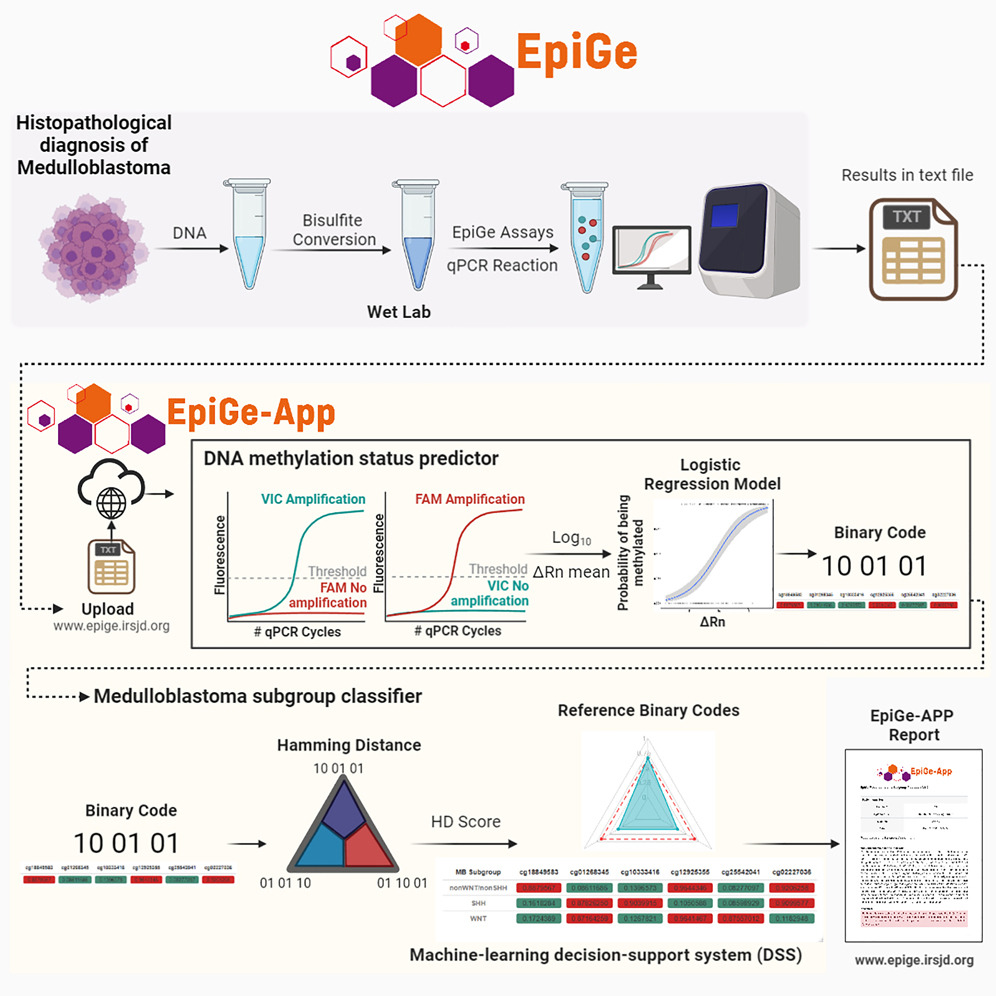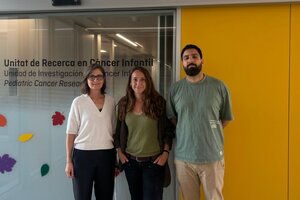Automated learning app improves accessibility to medulloblastoma classification
Medulloblastoma is a malignant brain cancer that mainly affects children and young people, accounting for approximately 20% of all the brain tumours in this population group. The precise classification of the molecular subgroups of medulloblastoma is crucially important in allowing oncologists to adapt and to personalise treatment strategies for each individual patient.
Now, a research team from the Institut de Recerca Sant Joan de Déu (IRSJD), the Sant Joan de Déu Barcelona Children's Hospital and the Universitat Politècnica de Catalunya (UPC) has developed a new simplified method of classification using qPCR technology, which is available at most of centres treating patients with medulloblastoma. This innovative method provides automatic interpretation of results by means of an artificial intelligence-based automated learning web application.
Why the molecular classification of medulloblastoma is so important
The molecular classification of medulloblastoma is becoming increasingly important for the routine diagnosis, risk stratification and selection of patients eligible for a specific subgroup treatment. Profiles based on whole-genome DNA methylation arrays are currently considered the standard for the classification of the molecular subgroups of medulloblastoma. Despite this, however, the application of array-based technology in a routine diagnostic setting may take a great deal of time, involve considerable cost and sometimes prove inaccessible for many medical centres worldwide that treat brain-tumour patients. Consequently, a significant number of patients are not able to benefit from the clinical advances associated with methylation-based medulloblastoma classification.
Faced with this situation, in 2018 a team led by Dr Cinzia Lavarino, director of the Molecular Oncology Laboratory at Sant Joan de Déu Barcelona Children's Hospital and coordinator of the Translational Genomics group at IRSJD (an institution belonging to CERCA, the Catalana network of centres of excellence in research), saw the need to simplify this method, to speed it up and to make it available to anyone who requires it.
"As part of her doctoral thesis, Dr Soledad Gómez analysed over the course of two years more than 1,500 medulloblastoma samples from around the world with the aim of determining the minimum number of markers allowing correct, precise and, above all, rapid classification. In this way, we have been able to develop a system that allows, with a reliability of 96%, the classification of medulloblastoma into the 3 subgroups of clinical interest (WNT, SHH and non-WNT/non-SHH)", explains Dr Cinzia Lavarino.
A web app available to all medical centres requiring it
The research was not limited to the search for biomarkers, however. The researchers wanted to take another step forward by making this technique available to medical centres throughout the world, regardless of their resources.
"We had discovered these key markers but we wanted everyone to have access to the method through a web platform so that no children would be left without recourse to this more personalised treatment. This led to the development of EpiGe, thanks to the support of the family associations of child cancer patients at Sant Joan de Déu Barcelona Children's Hospital and the telethon programme 'La Marató de TV3'", says Dr Soledad Gómez, postdoctoral researcher of the IRSJD's Translational Genomics group and coordinator of the project.
The EpiGe app, developed by Dr Soledad Gómez and the researcher Joshua Llano, both researchers of IRSJD, uses DNA methylation data obtained by the PCR technique to classify medulloblastoma samples into three groups. Since the PCR technique is generally available in laboratories throughout the world, the protocol designed by the team is accessible to everyone.
"We used 4,800 samples to train the learning algorithm, including 3,044 primary medulloblastomas and 1,644 non-medulloblastoma samples. These samples allowed us to generate a predictor algorithm of the methylation state on the basis of raw qPCR data and then, with this prediction, we generated an automatic classifier of medulloblastoma molecular subgroups. In view of this learning, we can state that EpiGe is capable of precisely classifying the molecular subgroups of medulloblastoma, and this can help medical teams to determine the most appropriate treatment in each case", in the words of Joshua Llano, a bioinformatician of the B2SLab group of the UPC Research Centre for Biomedical Engineering, IRSJD researcher.
The EpiGe app lets health professionals around the world upload the results obtained by following the detailed protocol posted on our website. In less than 2 minutes, the platform returns the result, providing a reliability of 96% in the identification of the medulloblastoma subgroup.

Physicians in Argentina and Pakistan have already shown an interest
The J.P. Garrahan Paediatric Hospital in Argentina expressed an interest in collaborating on the project of the Sant Joan de Déu Barcelona Children's Hospital · IRSJD in order to meet a diagnostic need that its professionals had been observing.
"At our hospital we are constantly striving to implement the latest advances in order to be able to offer our patients the same possibilities which are enjoyed by children treated in more developed countries. For this reason, when we learned about the EpiGe project on medulloblastoma classification, we did not hesitate to contact Drs Soledad Gómez and Cinzia Lavarino", state Drs Fabiana Lubieniecki, Valeria Vazquez and Francisco Barbosa.
The staff of the SJD Barcelona Children's Hospital · IRSJD helped and guided the Argentine professionals on learning how to use the platform, cooperating in this way on the development and improvement of molecular diagnosis in paediatric oncology.
"It has been a pleasure to see the results of this project published and to have cooperated on the verification of its feasibility and usefulness. We believe that this platform is a very valuable resource for developing a diagnostic strategy with a good cost-effectiveness ratio, and we are glad to have helped to make it accessible throughout the world", explain the professionals of the J.P. Garrahan Hospital.
"In addition to the Argentine physicians, professionals of the Rehman Medical Institute and the Khyber Medical College of the city of Peshawar in Pakistan have contacted us. Indeed, we hope that our platform will be come to be implemented in many more institutions in the future, enhancing in this way the personalised treatment of boys and girls around the world", states Dr Soledad Gómez.
This application not only simplifies and speeds up the process of classifying the molecular subgroups of medulloblastoma, but also marks a milestone in the democratisation of access to more personalised treatments, giving new hope to children affected by this brain tumour.
The development of the EpiGe app has been possible thanks to the financial support of the family associations of patients of the Sant Joan de Déu Barcelona Children's Hospital, the telethon programme "La Marató de TV3", and the Ministry of Science, Innovation and Universities.
Reference papers
Gómez-González S, Llano J, Garcia M, Garrido-Garcia A, Suñol M, Lemos I, Perez-Jaume S, Salvador N, Gene-Olaciregui N, Galán RA, Santa-María V, Perez-Somarriba M, Castañeda A, Hinojosa J, Winter U, Moreira FB, Lubieniecki F, Vazquez V, Mora J, Cruz O, La Madrid AM, Perera A, Lavarino C. EpiGe: A machine-learning strategy for rapid classification of medulloblastoma using PCR-based methyl-genotyping. iScience. 2023 Aug 12;26(9):107598. doi: 10.1016/j.isci.2023.107598. PMID: 37664618; PMCID: PMC10470382.
Gómez S, Garrido-Garcia A, Garcia-Gerique L, Lemos I, Suñol M, de Torres C, Kulis M, Pérez-Jaume S, Carcaboso ÁM, Luu B, Kieran MW, Jabado N, Kozlenkov A, Dracheva S, Ramaswamy V, Hovestadt V, Johann P, Jones DTW, Pfister SM, Morales La Madrid A, Cruz O, Taylor MD, Martin-Subero JI, Mora J, Lavarino C. A Novel Method for Rapid Molecular Subgrouping of Medulloblastoma. Clin Cancer Res. 2018 Mar 15;24(6):1355-1363. doi: 10.1158/1078-0432.CCR-17-2243. Epub 2018 Jan 19. PMID: 29351917.

